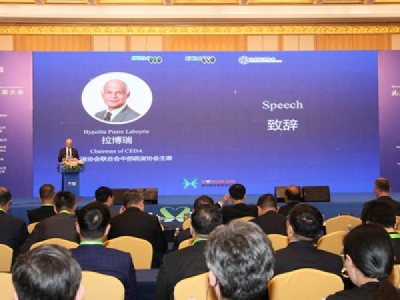
Posted on April 29, 2019
Competitive prices, engineering quality win approval
Chinese companies’ dredging projects in overseas markets via the Belt and Road Initiative (BRI) are warmly welcomed locally for their cost advantage and engineering quality, which provide a good balance against European dredging giants that used to dominate those markets, industry experts and company representatives told the Global Times on Tuesday.
They also expressed an attitude of understanding and support for the BRI, calling it a crucial initiative that increases the potential for cooperation between Chinese and overseas companies in many industries.
Their comments were made at the 22nd World Dredging Congress & Exhibition, which was held in Shanghai on Monday and Tuesday.
Luis Fernando Garcia da Silva, head of the Brazil-based Port Administration of Paranaguá and Antonina, said that the administration currently has two dredging project contracts with Chinese companies, one with the CCCC Shanghai Dredging Co and another with the China Merchants Group.
“My impression of Chinese dredging engineering teams is that not only do they offer relatively good prices, but their level of engineering quality is not too much different from European companies – I mean, very good quality,” he told the Global Times during a press briefing on Tuesday.
Casemiro Tecio Carvalho, chairman of the Brazil Santos Port Authority, said that Chinese dredging companies are “very important” to the Brazilian market and are welcomed locally, as they have created a kind of balance against Western companies in the Brazilian market.
“Both the relatively cheap prices offered by Chinese companies and the new equipment they put in our local market are very important (to push such cooperation),” he told the Global Times on Tuesday.
China’s dredging and port projects are on the increase in many countries and regions as the BRI offers incentives for Chinese companies to expand overseas.
A Xinhua News Agency report on April 19 cited China’s Foreign Minister Wang Yi as saying that in the six years since the initiative was proposed, China has invested more than $80 billion in countries and regions along the BRI route.
Huo Shengyong, general manager of CCCC Shanghai Dredging Co, said that the company had increased investment in overseas countries in recent years, primarily in dredging projects, as guided by the BRI. Apart from the work in Brazil, the company has also participated in the Colombo Port City project in Sri Lanka, where it has done work including land reclamation and created artificial beaches.
“We respect local laws and local environmental protection rules. Our projects in recent years have won a very good reputation locally and have brought good benefits to the local economy,” he told the Global Times on Tuesday.
The BRI in recent years has been questioned and attacked by some overseas media, which have raised allegations about exporting Chinese influence or causing debt problems in overseas markets.
Casemiro Tecio Carvalho said he did not think that the BRI was aggressive or anything similar, but a program based on equal business exchange. “What Brazil wants from China via the BRI is not only contracts or cheap prices, but how the two countries can further connect their cultures and knowledge through the initiative,” he said.
David Padman, chairman of the World Organization of Dredging Associations, told the Global Times on Tuesday that he supported the BRI as it provides chances of cooperation between companies in dredging or other sectors, including information and technology exchange, which is crucial.
Foreign Minister Wang Yi said that in terms of the BRI, false accusations like “debt trap” won’t win agreement from countries that have participated in the initiative.
“I think many of those accusations are made out of prejudice,” Cong Yi, deputy director of the economics department of Tianjin University of Finance and Economy, told the Global Times on Wednesday.”The BRI has led to many fruitful results and although there are setbacks, success prevails in those projects. I think the truth and the real effects of BRI projects should be made known to the world more,” he said.
Source: globaltimes.cn





